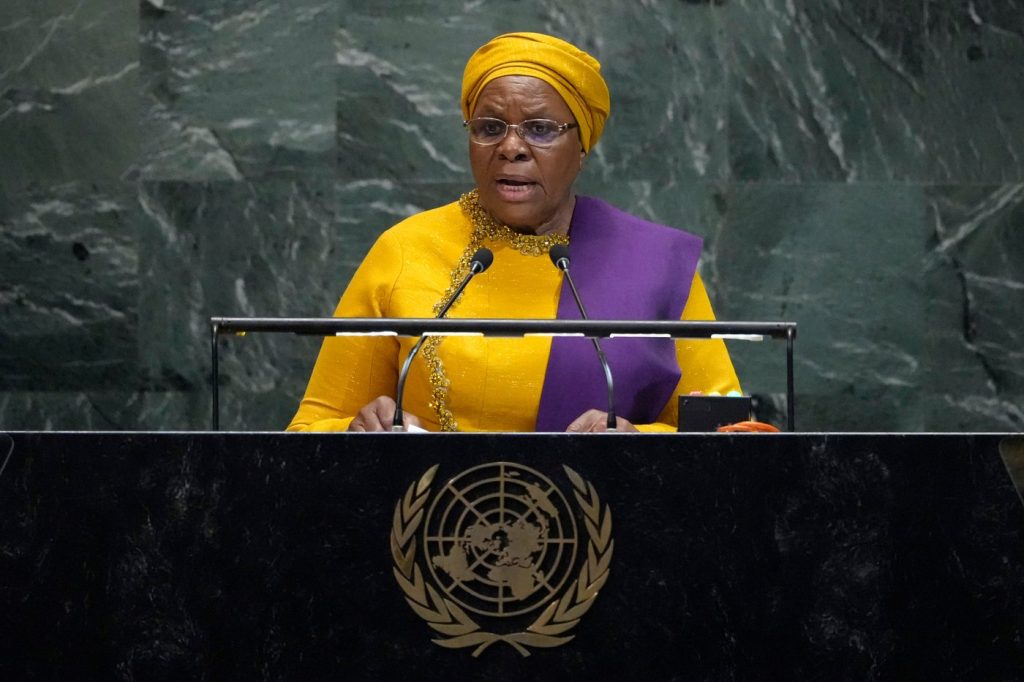World
African Leaders Focus on Global Issues, Overlook Home Conflicts

African leaders recently addressed pressing global issues at the United Nations General Assembly but largely sidestepped significant conflicts occurring within their own borders. Prominent figures, including Nigerian Vice President Kassim Shettima, Senegalese President Bassirou Faye, and Namibian President Netumbo Nandi-Ndaitwah, delivered impassioned speeches on topics such as climate change and inequality, while the humanitarian crises in Sudan and the Democratic Republic of Congo received minimal attention.
Analysts have noted that the lack of focus on these internal conflicts raises questions about the commitment of African leaders to address the dire situations affecting their nations. Chris Ogunmodede, an Africa affairs analyst, remarked, “African countries have sort of stepped back to some extent in terms of wanting to place African issues at the forefront of the U.N. agenda.” He highlighted that the most significant dates on the U.N. calendar featured scant references to African issues.
Humanitarian Crises in Sudan and Congo
The ongoing conflict in Sudan has escalated into what the U.N. describes as the world’s largest humanitarian crisis since it erupted in mid-2023. The violence began when the Rapid Support Forces (RSF), a paramilitary group, attacked the national armed forces, leading to a civil war that has claimed at least 40,000 lives. The country is now effectively divided, with the RSF concentrated in the western region of Darfur. Reports indicate that both factions have committed mass atrocities, and aid distribution remains severely restricted, exacerbating the humanitarian situation. A drone strike in early October killed at least 70 people in the besieged city of El-Fasher.
In the Democratic Republic of Congo, the situation is equally dire. Since January, the M23 rebel group, allegedly backed by Rwanda, has launched extensive attacks, rapidly capturing key urban areas. This conflict has resulted in around 7,000 deaths and has displaced millions, with many people trapped in rebel-held cities. The U.N. reports that more than 100 rebel groups are active in the resource-rich eastern region of the country. Although a peace initiative from Doha aimed to mediate between the Congolese government and the M23 group, fighting has persisted.
Beverly Ochieng, a senior security analyst at Control Risks, stated that the limited discussions surrounding Sudan and Congo represent a missed opportunity for African leaders to highlight these humanitarian crises.
External Influences in Conflict Resolution
The speeches at the General Assembly reflect a troubling trend: African leaders seem increasingly disengaged from the resolution of conflicts within their own countries. Ogunmodede pointed out the limitations of African institutions and their diminished ability to influence international affairs. Instead, external powers are taking the lead in negotiations, with some accused of complicity in the conflicts.
During the U.N. meetings, diplomatic leaders from the United States, United Arab Emirates, Saudi Arabia, and Egypt intensified efforts to broker peace in Sudan. A Washington-led agreement between Congo and Rwanda is also expected to be finalized in the coming weeks. The U.N. has indicated that Rwanda’s support for the M23 is a significant factor in the ongoing violence, which has drawn in neighboring countries like Burundi and Uganda.
In a notable development, Sudanese armed forces filed a case against the UAE at the U.N. top court, alleging that the UAE has armed the RSF and violated the genocide convention. The UAE has denied these allegations.
Ochieng emphasized that external interests hold significant leverage, which compels armed groups to engage with peace initiatives originating from outside the continent. Conversely, African institutions often lack the authority and incentive to foster effective peace and security initiatives.
As the situation unfolds, the global community continues to watch closely, aware that the responses from African leaders to these crises may significantly impact the future stability of the continent. The apparent disinterest in domestic issues at such a prominent international forum raises critical questions about the trajectory of African diplomacy and the prioritization of humanitarian concerns.
-

 Science2 months ago
Science2 months agoToyoake City Proposes Daily Two-Hour Smartphone Use Limit
-

 Health2 months ago
Health2 months agoB.C. Review Reveals Urgent Need for Rare-Disease Drug Reforms
-

 Top Stories2 months ago
Top Stories2 months agoPedestrian Fatally Injured in Esquimalt Collision on August 14
-

 Technology2 months ago
Technology2 months agoDark Adventure Game “Bye Sweet Carole” Set for October Release
-

 World2 months ago
World2 months agoJimmy Lai’s Defense Challenges Charges Under National Security Law
-

 Technology2 months ago
Technology2 months agoKonami Revives Iconic Metal Gear Solid Delta Ahead of Release
-

 Technology2 months ago
Technology2 months agoSnapmaker U1 Color 3D Printer Redefines Speed and Sustainability
-

 Technology2 months ago
Technology2 months agoAION Folding Knife: Redefining EDC Design with Premium Materials
-

 Technology2 months ago
Technology2 months agoSolve Today’s Wordle Challenge: Hints and Answer for August 19
-

 Business2 months ago
Business2 months agoGordon Murray Automotive Unveils S1 LM and Le Mans GTR at Monterey
-

 Lifestyle2 months ago
Lifestyle2 months agoVictoria’s Pop-Up Shop Shines Light on B.C.’s Wolf Cull
-

 Technology2 months ago
Technology2 months agoApple Expands Self-Service Repair Program to Canada









